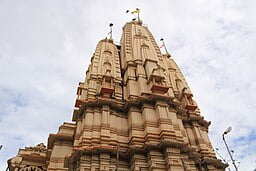Sanātana Dharma (Sanskrit: सनातन धर्म, meaning “eternal dharma”, “eternal order”)
It is an endonym used by Hindus to refer to Hinduism and a term denoting the list of “‘eternal’ or absolute set of duties or religiously ordained practices incumbent upon all Hindus”. It refers to the “eternal” truth and teachings of Hinduism. It can also be translated as “the natural and eternal way to live”. The term is used in Indian languages alongside the more common Hindu Dharma for Hinduism. Followers of Sanātana Dharma in general refer to themselves as Sanatani.
The beliefs of Sanatana Dharma are vast and complex, but some of the key concepts include:
- The belief in a single, eternal, and unmanifest Absolute Reality, called Brahman.
- The belief in the individual soul, or atman, which is a part of Brahman.
- The belief in reincarnation, or the cycle of birth, death, and rebirth.
- The belief in karma, or the law of cause and effect.
- The belief in moksha, or liberation from the cycle of reincarnation.
The goal of Sanatana Dharma is to achieve moksha, or liberation from the cycle of reincarnation. This can be achieved through a variety of means, including yoga, meditation, and selfless service.
Sanatana Dharma is a rich and complex tradition that has been evolving for thousands of years. It is a way of life that encompasses all aspects of human existence, from the spiritual to the practical. It is a path that can lead to liberation and enlightenment.
Here are some of the key practices of Sanatana Dharma:
- Yoga: Yoga is a mind-body practice that can help to unite the individual with the Absolute.
- Meditation: Meditation is a practice that can help to calm the mind and focus attention.
- Prayer: Prayer is a way of connecting with the divine.
- Rituals: Rituals are a way of expressing one’s faith and connecting with tradition.
- Charity: Charity is a way of giving back to the community and helping others.
Sanatana Dharma is a vast and complex tradition, but it is also a living tradition that is constantly evolving. It is a tradition that is open to all, regardless of their background or beliefs. If you are interested in learning more about Sanatana Dharma, there are many resources available to you. You can find books, websites, and even teachers who can help you on your journey.
Image credit
Chapelle musa, CC BY-SA 4.0, via Wikimedia Commons